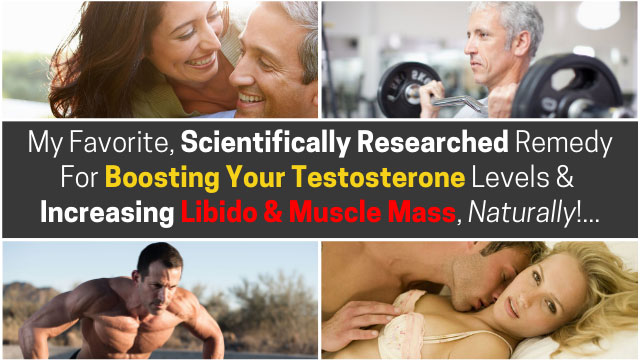It’s 2024 and I’m going to quickly discuss the 4 clinically proven ways to increase testosterone levels, naturally… from within your own body (“endogenously”)

This is an important topic for men, but for women as well!… Remember, both sexes have the same hormones, but only in different amounts.
Healthy increases in testosterone levels are important for optimal health, bone density, positive mood, sex drive, maximum muscle and strength, and also health problem prevention for BOTH sexes.1,2,3
The good news is that many people, including doctors, are aware of the numerous benefits of optimal testosterone levels.
Unfortunately, many people are looking for a quick fix with “exogenous” (outside) testosterone — such as injections and creams that contain testosterone.
The problem is that when you add testosterone into your body (like an injection), it has many negative side effects if it’s not managed properly. It can actually cause the OPPOSITE effects over time.
Doing it naturally (diet, exercise, supplements) is much better because you won’t have the negative effects and you’ll easily be able to maintain all the benefits long-term.4,5
It’s always best to do it naturally BEFORE you try “drugs”.
Besides, even if you wanted to take exogenous testosterone (injections, creams, etc.), by utilizing today’s “natural” methods will only ENHANCE the positive effects and give you even more benefits.6
Increase Testosterone – Diet
What you eat, is just as important as what you DON’T eat. Food controls your hormones.7
PROTEIN
About 25-35% of your protein source should be from fish, eggs, and free-range, grass-fed bison/buffalo. All the other sources, even the “free-range” chicken and cow/beef, still have lots of negative hormones — despite what the government or “label” tells you.8,9,10

Make sure you also have WHOLE eggs daily because cholesterol is needed to produce testosterone and other sex hormones. About 2-3 daily is fine.
Don’t worry, it won’t increase your cholesterol levels. That’s a myth for the most part.
Just make sure it’s free-range eggs. Try to have it raw and if not, keep the yolk a bit runny and soft.
Don’t overcook your protein or fry it. And stay away from Soy. It causes an increase in estrogen levels.
CARBS
Have about 40-50% of your diet from healthy carbohydrates — vegetables, fruits, lentils, yams, quinoa, and some white rice is fine in small amounts.11

Eliminate or reduce all sugars, man-made carbs, and processed foods (chips, pasta, bread, etc.)12
FATS
Make sure you have some healthy fats, about 25-30% of your diet. It helps produce many of your sex hormones, including testosterone. Most people eat the WRONG forms of fats, which can lower testosterone.13,14,15

Good fats are RAW coconut oil, macadamia oil, hemp oil, avocado, raw nuts/seeds, and egg yolks.
Increase Testosterone – Exercise
The RIGHT type of exercise can have dramatic effects on your hormones — positive OR negative.

Lifting heavy weights (6-12 repetitions) increases testosterone. You only need 3-4x weekly because too often will do the opposite because it’ll increase your stress hormone, Cortisol16 and keep your workouts to 45-60 mins or less.

Eliminate intense cardio such as running because it lowers testosterone and increases Cortisol, your stress hormone. If you want to run, keep it less than 20 or 30 min max. Anything over that and your testosterone drops.
It’s better to take a brisk, 30 min walk 3-5x weekly, preferably outside in the sun.17
Increase Testosterone – Life Style
Lifestyle changes have to do more with stress management and rest.

Sleep is very important. Most of us don’t get enough. So try to get to bed earlier. Squeeze in a little nap in the day as well if you can.18
Try to reduce negativity in your life because it increases your stress hormone, cortisol, and burns out your adrenal glands. 19,20
This means negative thoughts, information, media … as well as negative people. You can’t eliminate it, but you can certainly REDUCE some of the negatives in your life.
Increase Testosterone Supplements – Herbs & Vitamins
Most of us are deficient in numerous herbs, vitamins, and minerals.

In fact, it’s estimated that we would need to eat at least 27,575 calories daily21
to get all the nutrients our bodies need.
And even HIGHER as we age, due to poor absorption
Because of this, I HIGHLY suggest you take specific herbs, vitamins, and minerals to help boost your testosterone levels naturally, from within.
Not only will your libido and sex drive increase, but you’ll feel younger, have more energy, increase your muscle mass and lose belly fat because of the naturally higher testosterone levels.
And because this all happens naturally from WITHIN your own body, it’s safe for long-term use.

Some of the most effective and clinically researched herbal remedies for boosting your testosterone are: 22,23,24,25,26
-
- Testofen® Fenugreek Extract (Trigonella foenum-graecum; 50% fenusides, 50% Saponins)
- Avena Sativa Extract (Oat Straw 100:1)
- Tongkat Ali Extract (Eurycoma Longifolia Jack 100:1)
- Maca Root (6% Extract)
- Bulgarian Pro-Tribulus™ Terrestris Extract (90% Sapongenins + 40% protodioscin)
- Stinging Nettle (95% Extract) (Urtica Dioica)
- L-Arginine
- Zinc + Copper
- … and actually a few more.
Increase Testosterone – Summary
Eating better, exercising daily, and managing your stress levels take time, so please be patient.
Try to make small improvements daily and over the next few weeks and months, you’ll have new habits, a healthier body, and optimal testosterone levels.
If you want to speed up the process and you’re looking for faster results, adding specific supplements, herbs and vitamins can make dramatic improvements. Plus, it’s easy and convenient.
- http://www.ncbi.nlm.nih.gov/pubmed/26839520
- http://www.ncbi.nlm.nih.gov/pubmed/21709300
- http://www.ncbi.nlm.nih.gov/pubmed/9345114
- http://www.ncbi.nlm.nih.gov/pubmed/14501599
- http://www.ncbi.nlm.nih.gov/pubmed/15889125
- http://www.ncbi.nlm.nih.gov/pubmed/7714119
- http://www.ncbi.nlm.nih.gov/pubmed/3360302
- http://www.ncbi.nlm.nih.gov/pubmed/10355847
- http://www.ncbi.nlm.nih.gov/pubmed/14988451
- http://www.ncbi.nlm.nih.gov/pubmed/1984562
- http://www.ncbi.nlm.nih.gov/pubmed/9029197
- http://www.ncbi.nlm.nih.gov/pubmed/21855365
- http://www.ncbi.nlm.nih.gov/pubmed/3360302
- http://www.ncbi.nlm.nih.gov/pubmed/2526906
- http://www.ncbi.nlm.nih.gov/pubmed/6538617
- http://www.ncbi.nlm.nih.gov/pubmed/22234399
- http://www.ncbi.nlm.nih.gov/pubmed/15204068
- http://www.ncbi.nlm.nih.gov/pubmed/10454175
- http://www.ncbi.nlm.nih.gov/pubmed/16298085
- http://www.ncbi.nlm.nih.gov/pubmed/9629234
- http://www.ncbi.nlm.nih.gov/pubmed/20537171
- http://www.ncbi.nlm.nih.gov/pubmed/21242800
- http://www.ncbi.nlm.nih.gov/pubmed/19321573
- http://www.ncbi.nlm.nih.gov/pmc/articles/PMC2726624
- http://www.ncbi.nlm.nih.gov/pubmed/2526906
- http://www.ncbi.nlm.nih.gov/pubmed/2526906
